新概念英语第二册笔记-第30课
- 格式:doc
- 大小:32.50 KB
- 文档页数:9
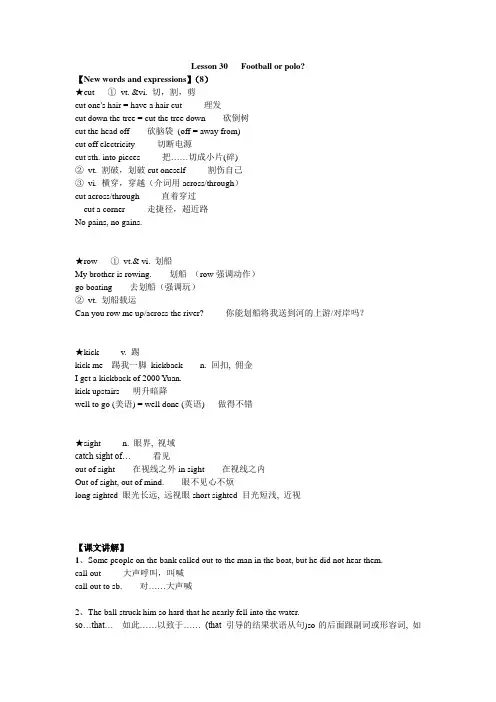
Lesson 30 Football or polo?【New words and expressions】(8)★cut ①vt. &vi. 切,割,剪cut one's hair = have a hair cut 理发cut down the tree = cut the tree down 砍倒树cut the head off 砍脑袋(off = away from)cut off electricity 切断电源cut sth. into pieces 把……切成小片(碎)②vt. 割破,划破cut oneself 割伤自己③vi. 横穿,穿越(介词用across/through)cut across/through 直着穿过cut a corner 走捷径,超近路No pains, no gains.★row ①vt.& vi. 划船My brother is rowing. 划船(row强调动作)go boating 去划船(强调玩)②vt. 划船载运Can you row me up/across the river? 你能划船将我送到河的上游/对岸吗?★kick v. 踢kick me 踢我一脚kickback n. 回扣, 佣金I get a kickback of 2000 Yuan.kick upstairs 明升暗降well to go (美语) = well done (英语) 做得不错★sight n. 眼界, 视域catch sight of… 看见out of sight 在视线之外in sight 在视线之内Out of sight, out of mind. 眼不见心不烦long sighted 眼光长远, 远视眼short sighted 目光短浅, 近视【课文讲解】1、Some people on the bank called out to the man in the boat, but he did not hear them.call out 大声呼叫,叫喊call out to sb. 对……大声喊2、The ball struck him so hard that he nearly fell into the water.so…that… 如此……以致于…… (that 引导的结果状语从句)so的后面跟副词或形容词, 如后跟名词时要用such +n. +that…【Composition】The wind(threw)(blew)his hat into the river. He(put)(took)out his hand (and) (but)tried to (reach)(catch)it(so)(but) he could not(so) (but) he(jumped) (fell) into the river(and)(but) got it. blew 吹,take out 拿出(put out 扑灭),and,reach够得着(catch 接住抓住),but,so,jump 自己跳(fall 掉进去),and【Summary writing 】4.The man in the boat neither saw the ball nor heard people shouting.6.However,the man was not angry and he threw the ball back to the bank.but连接两个句子, 中间可用逗号隔开;however只是副词, 只表示意思上得转折, 它可以放在句首也可以放在句中, 只是用一个逗号把它和其他的词隔开就可以【Key structures】The, Some and Anysome不用于否定句,any通常用于否定句和疑问句,some在表示邀请的语气中或在疑问句中如果所期望的回答是肯定的,可以取代anyDo you want some? / Would you want something?Do you want any drink? 你想要喝点什么吗?(不愿意给别人喝)在姓名、地名、国名(非复合词)前面通常不加任何冠词。

裕兴新概念英语第二册笔记第30课Lesson 30 Football or polo? 足球还是水球?What happened to the man in the boat?The Wayle is a small river that cuts across the park near my home. I like sitting by the Wayle on fine afternoons. It was warm last Sunday, so I went and sat on the river bank as usual. Some children were playing games on the bank and there were some people rowing on the river. Suddenly, one of the children kicked a ball very hard and it went towards a passing boat. Some people on the bank called out to the man in the boat, but he did not hear them. The ball struck him so hard that he nearly fell into the water. I turned to look at the children, but there weren't any in sight: they had all run away! The man laughed when he realized what had happened. He called out to the children and threw the ball back to the bank.参考译文威尔河是横穿过我家附近公园的一条小河。
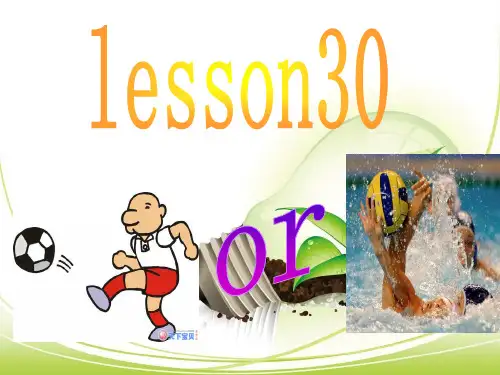
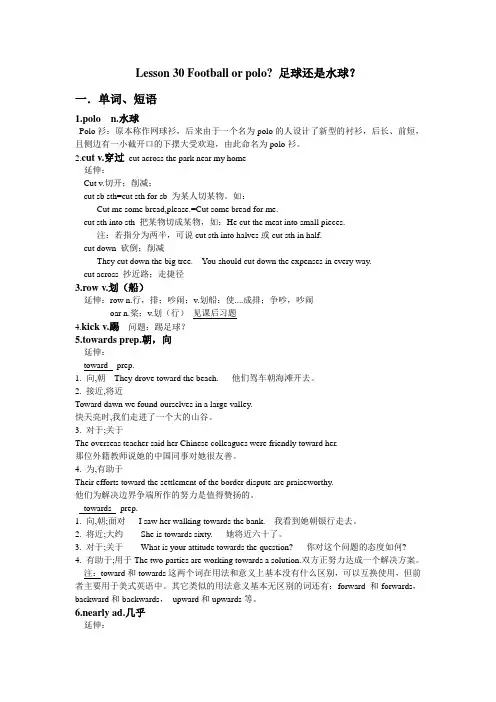
Lesson 30 Football or polo? 足球还是水球?一.单词、短语1.polo n.水球Polo衫:原本称作网球衫,后来由于一个名为polo的人设计了新型的衬衫,后长、前短,且侧边有一小截开口的下摆大受欢迎,由此命名为polo衫。
2.cut v.穿过cut across the park near my home延伸:Cut v.切开;削减;cut sb sth=cut sth for sb 为某人切某物。
如:Cut me some bread,please.=Cut some bread for me.cut sth into sth 把某物切成某物,如:He cut the meat into small pieces.注:若指分为两半,可说cut sth into halves或cut sth in half.cut down 砍倒;削减They cut down the big tree. You should cut down the expenses in every way.cut across 抄近路;走捷径3.row v.划(船)延伸:row n.行,排;吵闹;v.划船:使....成排;争吵,吵闹oar n.桨;v.划(行)见课后习题4.kick v.踢问题:踢足球?5.towards prep.朝,向延伸:toward prep.1. 向,朝They drove toward the beach. 他们驾车朝海滩开去。
2. 接近,将近Toward dawn we found ourselves in a large valley.快天亮时,我们走进了一个大的山谷。
3. 对于;关于The overseas teacher said her Chinese colleagues were friendly toward her.那位外籍教师说她的中国同事对她很友善。
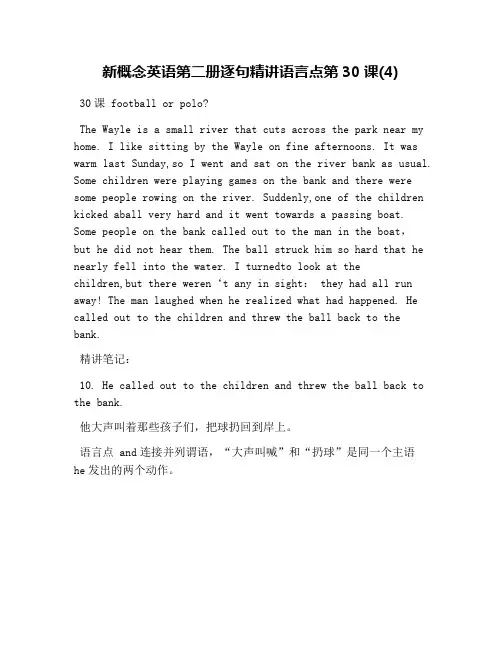
新概念英语第二册逐句精讲语言点第30课(4)30课 football or polo?The Wayle is a small river that cuts across the park near my home. I like sitting by the Wayle on fine afternoons. It was warm last Sunday,so I went and sat on the river bank as usual. Some children were playing games on the bank and there were some people rowing on the river. Suddenly,one of the children kicked aball very hard and it went towards a passing boat. Some people on the bank called out to the man in the boat,but he did not hear them. The ball struck him so hard that he nearly fell into the water. I turnedto look at thechildren,but there weren‘t any in sight: they had all run away! The man laughed when he realized what had happened. He called out to the children and threw the ball back to the bank.精讲笔记:10. He called out to the children and threw the ball back to the bank.他大声叫着那些孩子们,把球扔回到岸上。

新概念英语第二册笔记-第三十课tear 撕裂trim 修剪row1) n.一排,一列,一行,成排的座位例: The boy was sitting in the first row.这个小男孩坐在第一排。
Would you arrange the chairs in five rows?你把椅子排成五排吗?in a row排成一排连续的例: Children were standing hand in hand in a row. 孩子们手拉手的站成一排。
He has been absent for 5 years in a row.他已经连续五天缺席了。
a hard row to hoe(v.用耕锄耕地)艰苦的生活row 横行line竖排file一纵队(排的很整齐)2)V.划船例:Can you row a boat? 你会划船吗?They rowed across the rive。
他们划过了这条河。
3)n划船运动go for a row去划船go for a walk去散步4)划船;一排(列)row(rau]争吵row Iraulv. row with sb 与...争吵n.例:What' s the row about? 到底在吵什么呢?make a row/kick up a row起哄,大吵大闹kick1)v.踢kick sb /sth with the foot 踢例: Mummy, Dick kicked me on the leg!妈妈,Dick踢我的腿。
(Tom, Dick, Harry人的名字)kick the ball踢kick a hole in the door在门上踢了一个洞Be careful of that horse-it often kicks.小心这匹马,它常踢人。
(idiom) Kick a man when he is down.落井下石2) vt.虐待,欺负例: The boy is always kicking his younger brother about.这个小男孩总是欺负他弟弟。
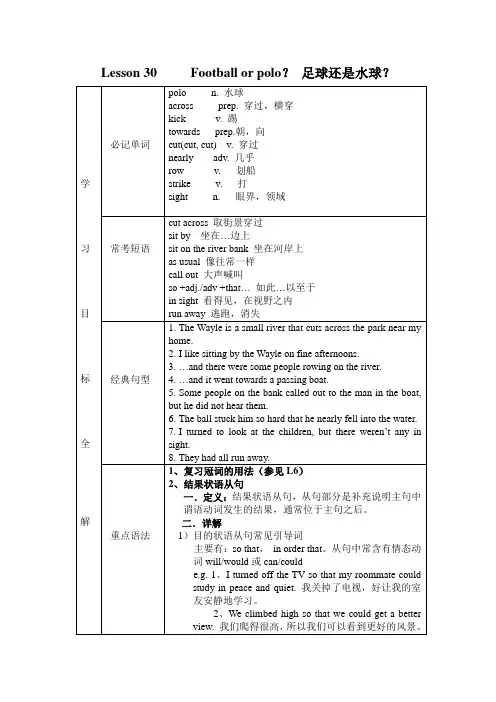
Lesson 30 Football or polo?足球还是水球?学习目标全解必记单词polo n. 水球across prep. 穿过,横穿kick v. 踢towards prep.朝,向cut(cut, cut) v. 穿过nearly adv. 几乎row v. 划船strike v. 打sight n. 眼界,领域常考短语cut across 取街景穿过sit by 坐在…边上sit on the river bank 坐在河岸上as usual 像往常一样call out 大声喊叫so +adj./adv +that…如此…以至于in sight 看得见,在视野之内run away 逃跑,消失经典句型1.The Wayle is a small river that cuts across the park near myhome.2.I like sitting by the Wayle on fine afternoons.3.…and there were some people rowing on the river.4.…and it went towards a passing boat.5.Some people on the bank called out to the man in the boat,but he did not hear them.6.The ball stuck him so hard that he nearly fell into the water.7.I turned to look at the children, but there weren’t any insight.8.They had all run away.重点语法1、复习冠词的用法(参见L6)2、结果状语从句一.定义:结果状语从句,从句部分是补充说明主句中谓语动词发生的结果,通常位于主句之后。
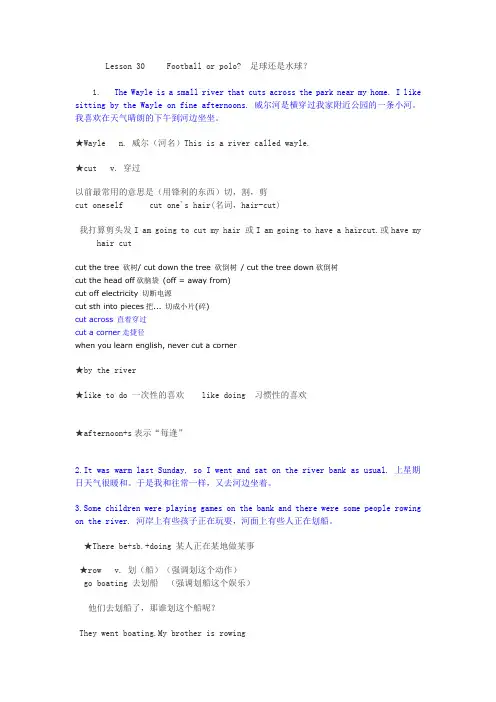
Lesson 30 Football or polo? 足球还是水球?1. The Wayle is a small river that cuts across the park near my home. I like sitting by the Wayle on fine afternoons. 威尔河是横穿过我家附近公园的一条小河。
我喜欢在天气晴朗的下午到河边坐坐。
★Wayle n. 威尔(河名)This is a river called wayle.★cut v. 穿过以前最常用的意思是(用锋利的东西)切,割,剪cut oneself cut one's hair(名词,hair-cut)我打算剪头发I am going to cut my hair 或I am going to have a haircut.或have my hair cutcut the tree 砍树/ cut down the tree 砍倒树/ cut the tree down砍倒树cut the head off砍脑袋(off = away from)cut off electricity 切断电源cut sth into pieces把... 切成小片(碎)cut across 直着穿过cut a corner走捷径when you learn english, never cut a corner★by the river★like to do 一次性的喜欢 like doing 习惯性的喜欢★afternoon+s表示“每逢”2.It was warm last Sunday, so I went and sat on the river bank as usual. 上星期日天气很暖和。
于是我和往常一样,又去河边坐着。
3.Some children were playing games on the bank and there were some people rowing on the river. 河岸上有些孩子正在玩耍,河面上有些人正在划船。
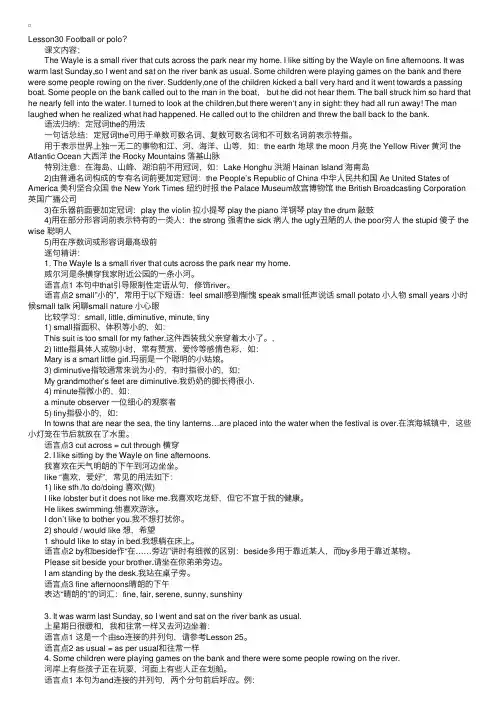
Lesson30 Football or polo? 课⽂内容: The Wayle is a small river that cuts across the park near my home. I like sitting by the Wayle on fine afternoons. It was warm last Sunday,so I went and sat on the river bank as usual. Some children were playing games on the bank and there were some people rowing on the river. Suddenly,one of the children kicked a ball very hard and it went towards a passing boat. Some people on the bank called out to the man in the boat, but he did not hear them. The ball struck him so hard that he nearly fell into the water. I turned to look at the children,but there weren‘t any in sight: they had all run away! The man laughed when he realized what had happened. He called out to the children and threw the ball back to the bank. 语法归纳:定冠词the的⽤法 ⼀句话总结:定冠词the可⽤于单数可数名词、复数可数名词和不可数名词前表⽰特指。
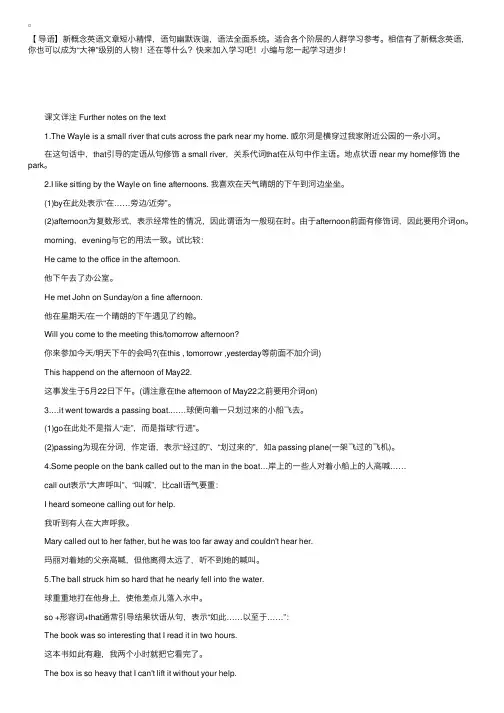
【导语】新概念英语⽂章短⼩精悍,语句幽默诙谐,语法全⾯系统。
适合各个阶层的⼈群学习参考。
相信有了新概念英语,你也可以成为“⼤神”级别的⼈物!还在等什么?快来加⼊学习吧!⼩编与您⼀起学习进步! 课⽂详注 Further notes on the text 1.The Wayle is a small river that cuts across the park near my home. 威尔河是横穿过我家附近公园的⼀条⼩河。
在这句话中,that引导的定语从句修饰 a small river,关系代词that在从句中作主语。
地点状语 near my home修饰 the park。
2.I like sitting by the Wayle on fine afternoons. 我喜欢在天⽓晴朗的下午到河边坐坐。
(1)by在此处表⽰“在……旁边/近旁”。
(2)afternoon为复数形式,表⽰经常性的情况,因此谓语为⼀般现在时。
由于afternoon前⾯有修饰词,因此要⽤介词on。
morning,evening与它的⽤法⼀致。
试⽐较: He came to the office in the afternoon. 他下午去了办公室。
He met John on Sunday/on a fine afternoon. 他在星期天/在⼀个晴朗的下午遇见了约翰。
Will you come to the meeting this/tomorrow afternoon? 你来参加今天/明天下午的会吗?(在this , tomorrowr ,yesterday等前⾯不加介词) This happend on the afternoon of May22. 这事发⽣于5⽉22⽇下午。
(请注意在the afternoon of May22之前要⽤介词on) 3.…it went towards a passing boat.……球便向着⼀只划过来的⼩船飞去。
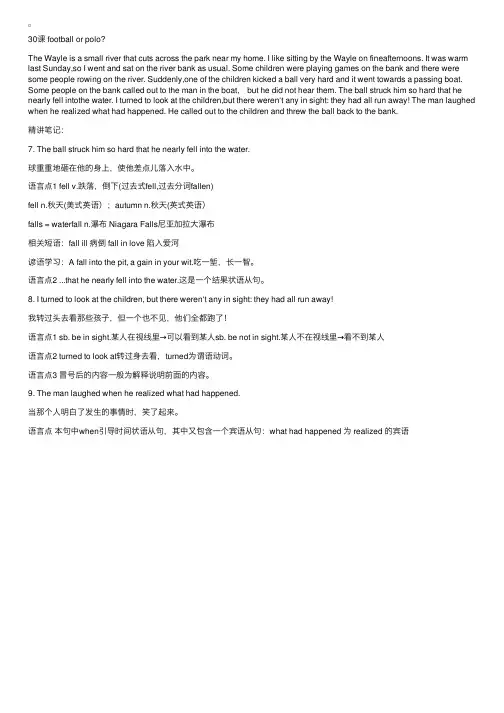
30课 football or polo?The Wayle is a small river that cuts across the park near my home. I like sitting by the Wayle on fineafternoons. It was warm last Sunday,so I went and sat on the river bank as usual. Some children were playing games on the bank and there were some people rowing on the river. Suddenly,one of the children kicked a ball very hard and it went towards a passing boat. Some people on the bank called out to the man in the boat, but he did not hear them. The ball struck him so hard that he nearly fell intothe water. I turned to look at the children,but there weren‘t any in sight: they had all run away! The man laughed when he realized what had happened. He called out to the children and threw the ball back to the bank.精讲笔记:7. The ball struck him so hard that he nearly fell into the water.球重重地砸在他的⾝上,使他差点⼉落⼊⽔中。
Lesson 30 Football or polo? 足球还是水球?What happened to the man in the boat?The Wayle is a small river that cuts across the park near my home. I like sitting by the Wayle on fine afternoons. It was warm last Sunday, so I went and sat on the river bank as usual. Some children were playing games on the bank and there were some people rowing on the river. Suddenly, one of the children kicked a ball very hard and it went towards a passing boat. Some people on the bank called out to the man in the boat, but he did not hear them. The ball struck him so hard that he nearly fell into the water. I turned to look at the children, but there weren't any in sight: they had all run away! The man laughed when he realized what had happened. He called out to the children and threw the ball back to the bank.参考译文威尔河是横穿过我家附近公园的一条小河。
Football or polo?足球还是水球?-新概念英语第二册自学导读笔记第30课新概念英语第二册第30课课文重难点 further notes on the text1.the wayle is a small river that cuts across the park near my home. 威尔河是横穿过我家附近公园的一条小河。
在这句话中,that引导的定语从句修饰 a small river,关系代词that在从句中作主语。
地点状语 near my home修饰 the park。
2.i like sitting by the wayle on fine afternoons. 我喜欢在天气晴朗的下午到河边坐坐。
(1)by在此处表示"在……旁边/近旁"。
(2)afternoon为复数形式,表示经常性的情况,所以谓语为一般现在时。
因为afternoon前面有修饰词,所以要用介词on。
morning,evening与它的用法一致。
试比较:3.…it went towards a passing boat.……球便向着一只划过来的小船飞去。
(1)go在此处不是指人"走",而是指球"行进"。
(2)passing为现在分词,作定语,表示"经过的"、"划过来的",如a passing plane(一架飞过的飞机)。
4.some people on the bank called out to the man in the boat…岸上的一些人对着小船上的人高喊……call out表示"大声呼叫"、"叫喊",比call语气要重:i heard someone calling out for help.我听到有人在大声呼救。
mary called out to her father, but he was too far away and couldn't hear her.玛丽对着她的父亲高喊,但他离得太远了,听不到她的喊叫。
Football or polo?单词讲解polo马球(四人一组骑在马上对打木球的比赛)水球water poloWayle n.威尔(河名)Cut vt.切,割,剪,划,砍cut--cut--cut例: She cut her finger on a piece of broken glass.他在一块碎玻璃上划伤自己的手指。
cut the apple into halves 把苹果切成两半cut the apple into thirds 把苹果切成三半cut恤e apple into quarters 把苹果切成四半His cruel remarks cut her deeply.他残酷的评论伤透了她的心.cut的有关短语:cut class 旷课cut across/cut through 穿过(尤指抄近道)例: I usually cut across the park on my way home.I usually cut through the park on rny way home.我回家的路上总是穿过那个公园。
cut down砍到(树木)减少…量例: The apple tree was dead and he cut it down.这个苹果树死了,他把树砍倒了。
The car industry cut down production.汽车工业降低了产量。
cut down the expenses减少开支chop 劈slit 切割开gash 砍进(割一条长而深的缺口)slice 切成薄片carve 雕刻dice 切成小方块tear 撕裂trim 修剪row1) n.一排,一列,一行,成排的座位例: The boy was sitting in the first row.这个小男孩坐在第一排。
Would you arrange the chairs in five rows?你把椅子排成五排吗?in a row排成一排连续的例: Children were standing hand in hand in a row.孩子们手拉手的站成一排。
He has been absent for 5 years in a row.他已经连续五天缺席了。
a hard row to hoe(v.用耕锄耕地)艰苦的生活row 横行line竖排file一纵队(排的很整齐)2)V.划船例:Can you row a boat? 你会划船吗?They rowed across the rive。
他们划过了这条河。
3)n划船运动go for a row去划船go for a walk去散步4)划船;一排(列)row(rau]争吵row Iraulv.row with sb 与...争吵n.例:What' s the row about? 到底在吵什么呢?make a row/kick up a row起哄,大吵大闹kick1)v.踢kick sb /sth with the foot 踢例: Mummy, Dick kicked me on the leg!妈妈,Dick踢我的腿。
(Tom,Dick,Harry人的名字)kick the ball踢kick a hole in the door在门上踢了一个洞Be careful of that horse-it often kicks.小心这匹马,它常踢人。
(idiom) Kick a man when he is down.落井下石2) vt.虐待,欺负例: The boy is always kicking his younger brother about.这个小男孩总是欺负他弟弟。
kick脚踢punch 拳打toward (s) prep.朝…方向对(表关系),接近(表时间),有...趋势例:He walked towards the door.他朝门走过来。
His attitude towards me has changed.他对我的态度转变了。
Towards the end of the game she fell asleep.临近比赛结束时,她睡着了。
There is a tendency towards inflation.有通货膨胀的趋势。
towards只能表示朝着目标移动(强调越来越近)例:We drove towards Miami.我们开车去迈阿密。
to含有到达的含义例:We drove to Miami.我们开车到了迈阿密。
nearly adv.大约,接近,差不多例:It's nearly 2 o'clock.大约两点了。
That car nearly ran over a dog.那辆车差点撞到一条狗。
almost与nearly最接近,但almost可与nobody,nothing,nowhere,never连用nearly则不能。
approximately/ about在超过或没有超过某标准的两种情况下,均可使用,但almost,nearly用于接近单位达到某标准的情况。
例: It cost approximately £300, I can't remember exactIY.大概花了300美元我记不太清了。
sight n.1)视力,视觉lose one's sight 失明(become blind)far-sighted 远视near-sighted 近视short-sighted 目光短浅的long-sighted 目光长远的例:Out of sight,Out of mind.眼不见,心不烦。
at the sight of —看至到(seeing)We laughed at the sight of her strange clothes.我们一见她的奇装异服就笑了。
He fell in love with the girl at the first sight.他对那女孩子一见钟情。
2)视界,视野in sight 在视野之内out of sight 在视野之外例:The train is still in sight.火车还看得见。
Get out of my sight. 滚开! (Get out!)Get out of here!Get awaY from here!关键句型Key Structuressome /any的用法。
1)二者都可以表示不定量的代词,相当于“一止暨”,可修饰可数名词复数和不可数名词,some多用于肯定句,any多用于疑问句,否定句或条件从句。
例: There are some scenic spots around the city.在这个城市周边有些风景优美的地方。
Let's get some fruit for the children.给孩子们买些水果吧。
Do you need any reference books? 你需要一些参考书吗?They haven' t put forward any concrete proposals.他们还没有提出一些明确的建议。
If you find any new words in it, mark them out.如果你发现那些生词的话,把它们标出来。
2)有些疑问句表示请求,建议,反问等,这时多用some而不用any;例:Would you mind buying me some aspirin?你为我买些阿司匹林好吗?Aren' t there some stamps in that drawer?抽屉里面有邮票吗?3) some和any还可以用来修饰可数名词单数,这时some表示“某一个“any表示”任何一个“随便哪一个”。
例:You will regret it someday.总有一天你会后悔的。
You can get it in any department store.你在任何一个百货商店都可以买到。
冠词the的用法1)在人名和地名前不加冠词a或the例: John lives in England. He has a house in London.2)在海洋,河流,山脉前,一定要用定冠词the例: Who was the first person to sail across the Pacific?谁是第一个横渡太平洋的人呢?It can get rough in the Mediterranean (地中海)。
地中海可能很不平静cMany great cities are built on rivers; 1'aris is on the Seine,London is on the Thames and Rorne is on the Tiber.很多大城市建在河岸上,巴黎在桑纳河上,伦敦在泰晤士河上,罗马在地波河上。
I know a man who has been on climbing expeditions in many parts of the world. He has climbed inthe Alps, the Himalayas,and the Rocky Mountains.我认识一个参加过世界各地登山探险的人,他曾攀登过阿尔卑斯山脉,喜马拉雅山山脉以及落基山。
3)由普通名词构成的专有名词前加the。
America-the Unite States of AmericaChina- the People' s Republic of Chinathe Great Wall , the Summer Palace, the Forbidden City4)表示特定的或上文提到过的事物(或双方都明了的事物)前加the。
例:工am interested in the film.我对这部电影感兴趣。
Pass me the slippers please.请把拖鞋递给我。
5)世界上独一无二的事物前加thethe earth the moon the sun6)在序数词或形容词的高级前加thethe second storey二层楼the largest room最大的房间7)在方位词前面加theon the lefton the rightin the eastin the west8)在表示时间的一些固定短语前加thein the morning in the afternoonin the evening in the day time9)the放在形容词前表一类人the poor the rich the old the young the sick the new the blind IO) 在姓氏复数形式前,表示一家人或夫妇俩。